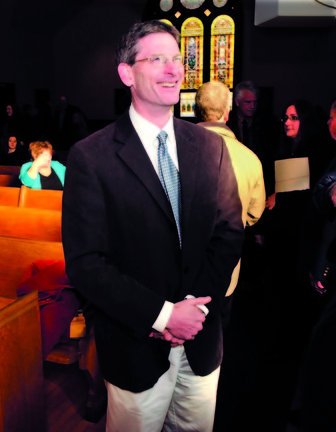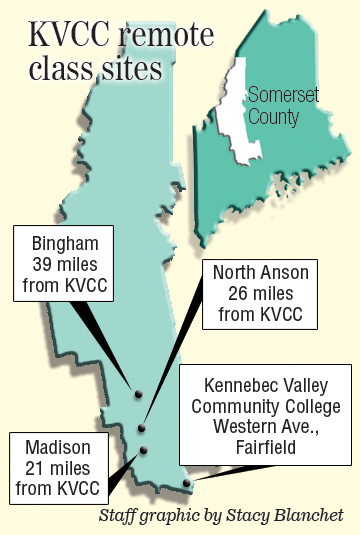FAIRFIELD — People who live in rural communities may be more likely to face barriers to education, but organizers behind a new program at Kennebec Valley Community College are hopeful that they can help people overcome those challenges.
Along with the Somerset County Economic Development Corps, the college is trying to offer classes remotely to students who otherwise might not be able to attend — those who live an hour or more drive from the campus near the Somerset-Kennebec county line.
Higher education means equipping people with the skills they need to succeed in the workforce and ultimately bringing economic improvements to the area, said Jim Batey, executive director of the Somerset County Economic Development Corps.
“Our goal is to raise the skill levels of the residents of Somerset County to become better educated and better employees,” Batey said.
In 2012, unemployment among people with at least a bachelor’s degree was 2.6 percent, while unemployment among those who had not achieved beyond a high school diploma was 9.7 percent, according to the Maine Department of Labor. The statewide unemployment rate is 6.7 percent, while the rate for Somerset County is 8.3 percent.
The types of skills employers say they are looking for break down into four categories, Batey said. They are written and verbal communications, basic computer skills, critical and analytical thinking and customer service skills, he said.
In more rural parts of the county, as well as rural parts of the state, many circumstances act as barriers to education. They include a lack of affordable transportation, lack of child care, too little disposable income and lower career aspirations, Batey said.
At the Fairfield-based community college, 52 percent of students come from Kennebec County and 28 percent from Somerset, according to the most recent data available. The rest of the students come from other counties in Maine, except for a small percentage from out of state, said Jon Connolly, vice president and dean of academic affairs.
There are no other institutions for higher learning in Somerset County, Batey said. The University of Maine at Farmington is about 30 miles from downtown Skowhegan, while Thomas College and Colby College are about 20 miles away.
North of Skowhegan, access is even more difficult. The town of Bingham is about an hour’s commute one-way from either Waterville or Fairfield. The University of Maine, in Orono, is more than an hour and a half’s drive from Bingham and more than an hour from Anson.
In the new program, classes would be offered in Anson, Bingham and Madison. The college already is planning to offer a sociology class at Carrabec High School in North Anson beginning this spring.
“Being able to take college classes in your own community is huge,” said Regina Campbell, principal at Carrabec High School, who is scheduledto teach the spring sociology class. “Having students in an environment they are comfortable with raises their aspirations and their confidence. That is huge for first-generation college students.”
The high school now offers four dual-enrollment classes through KVCC as well as one through Thomas College, which students can take to earn college credit. The sociology class would be the first class that is open to the public, Campbell said.
Students who are interested in enrolling must complete an assessment to determine how ready they are to take classes. The assessment, which is being offered in all three communities where the college wants to begin offering classes, also will include a survey asking for feedback on what types of classes should be offered, at what times and where.
The movement is part of an effort to expand the offerings of the college, which recently broke ground on a new building at its Harold Alfond Campus in Hinckley. New two-year programs centered on farming, food science and culinary arts will be taught and are expected to attract about 120 new students to the school, which now has a student enrollment of about 2,300.
Even with the new campus in Fairfield, however, many rural communities are underserved, Connolly said. He said that while the college does offer classes online, there are certain advantages to being in a classroom that an online education can’t offer.
For instance, having face-to-face time with other students and teachers can help students foster relationships within the college community, he said.
Taking online classes also requires access to high-speed Internet, which Connolly said might not be possible in some rural areas where the Internet is available through dial-up service.
Campbell said she thinks many of her high school students want to stay in the area, but in order for them to support themselves they need a postsecondary education, she said.
“To have this option in your own backyard, how can we not do this? I think it’s the best economic development plan this area could ask for,” Campbell said.
Rachel Ohm — 612-2368rohm@centralmaine.com
Send questions/comments to the editors.





Success. Please wait for the page to reload. If the page does not reload within 5 seconds, please refresh the page.
Enter your email and password to access comments.
Hi, to comment on stories you must . This profile is in addition to your subscription and website login.
Already have a commenting profile? .
Invalid username/password.
Please check your email to confirm and complete your registration.
Only subscribers are eligible to post comments. Please subscribe or login first for digital access. Here’s why.
Use the form below to reset your password. When you've submitted your account email, we will send an email with a reset code.